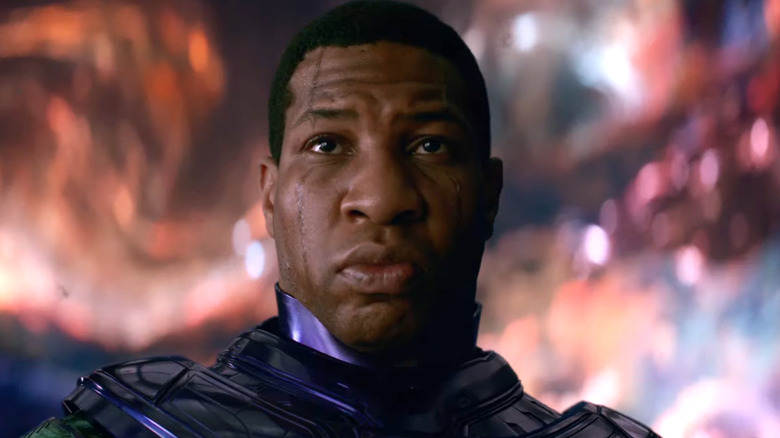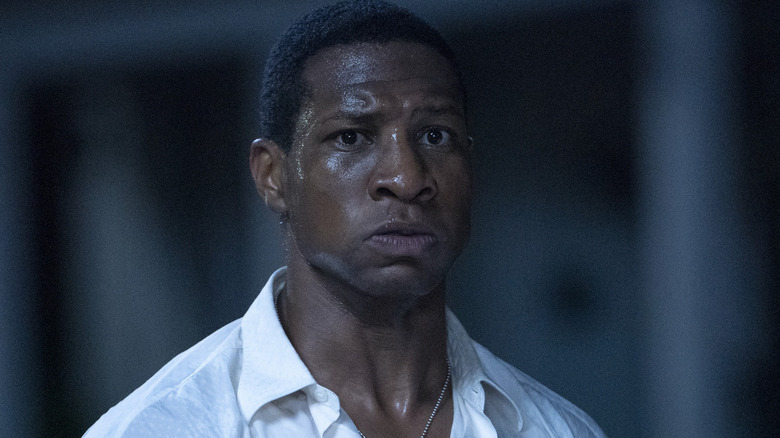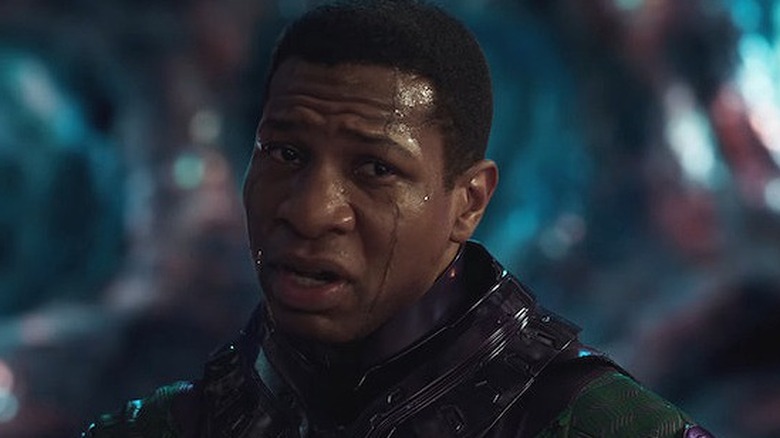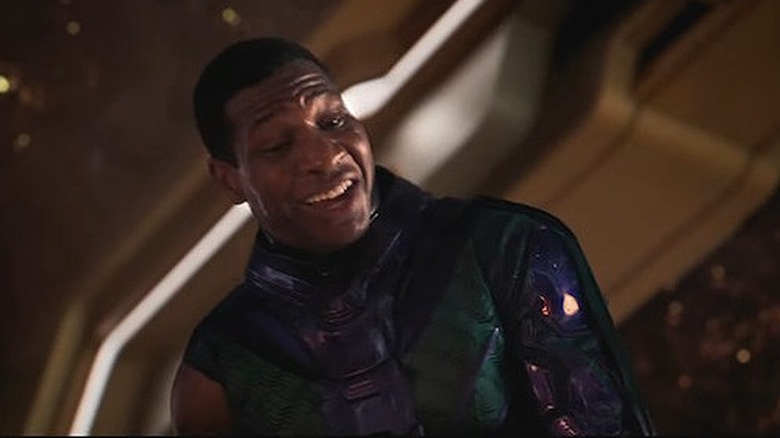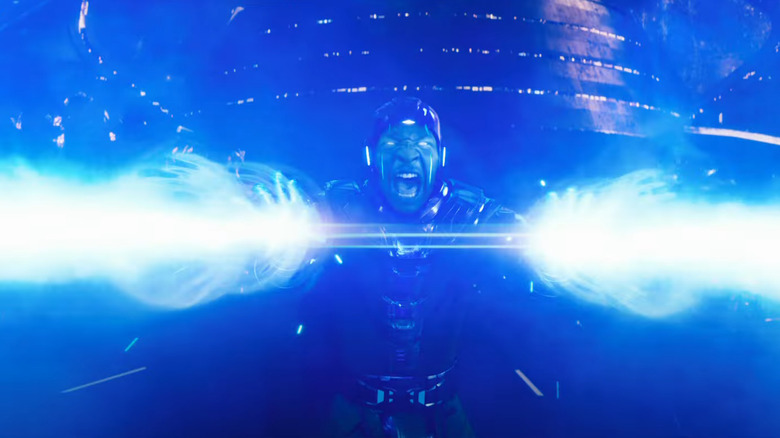Jonathan Majors Will Out-Villain Josh Brolin In The MCU (& Why That's A Good Thing)
It took a long time for him to get off that space toilet, but once Thanos, as portrayed by Josh Brolin, finally decided to take matters into his own hands, it was game over for the Avengers. Thanos took center stage in "Avengers: Infinity War," which paid off a decade of interconnected cinematic storytelling and demonstrated to MCU fans why the Mad Titan's name sparked fear across the universe, and why he is now remembered as one of the all-time greatest superhero movie villains.
Almost five years later, it's still easy to remember how gigantic the movie felt. Anyone who saw "Infinity War" during its opening can attest to the gasps that rippled through the auditorium when the movie ended with Thanos having ended half the life in the universe, including a good chunk of The Avengers themselves. The following year, when fans returned to theaters for "Avengers: Endgame," their grudge against the purple-chinned tyrant was personal. Cheers erupted when Captain America (Chris Evans) wielded Mjolnir against Thanos, and sobs swept crowds when Tony Stark (Robert Downey Jr.) sacrificed his life to kill the Titan and his armies.
But an even greater evil mastermind is on the horizon, as Jonathan Majors takes the stage as Kang, the Conqueror. While the notion that Majors could do a better job than Brolin did may seem apocryphal to some, it's more likely than you may assume. Not only does Majors have, well, major acting chops, but it's also the case that the MCU has learned a lot of lessons from the three phases leading up to "Infinity War." And with franchise fatigue finally setting in, it can't afford to screw things up with its next major villain. All of that means Kang is perfectly positioned to become the greatest villain in MCU history.
Majors has proven himself a phenomenal actor
Jonathan Majors may not be as established an actor as Josh Brolin, but he's already proven himself to be one of the most dedicated performers in the business. After graduating from the University of North Carolina School of the Arts, he pursued an MFA in drama from Yale, but quickly began booking lead roles and dropped out of the Ivy League program (via Variety).
His talent is most ferociously displayed on HBO's unfortunately short-lived "Lovecraft Country," in which Majors plays Atticus Freeman, a soldier returning home from the horrors of the Korean War to Jim Crow America, where he finds his family history intertwined with that of a white supremacist, occultist cabal who use the power of dark magic to unleash hell on Black people across the country. But though the show only aired for one season, it was enough to prove that Majors is the real deal. For his role, Majors got an Emmy nod for outstanding lead actor in a drama series.
Majors has only appeared once in the MCU — as the variant of Kang called He Who Remains for a single episode of "Loki." However, he stole the show from Tom Hiddleston and Sophia Di Martino. That's no small feat, considering the caliber of his co-stars. As the god of mischief battled the Time Variance Authority alongside his variant, Sylvie, they eventually found a citadel at the end of time, ruled over by the true brains behind the organization. From the moment Majors appears, he's the most captivating presence on the screen. Considering how much of his dialogue is exposition, that's no small feat. And, as he warns, "If you think I'm evil, well, just wait until you meet my variants."
Kang is a more complex villain
If you thought Kang inspired fear as He Who Remains, a man who conquered the multiverse and established a powerful bureaucracy to keep it in line, you should be trembling at the thought of his other variants now that they've been let loose. Thanos dropped fans' jaws by dusting half the universe, but Kang is coming for every universe in existence, and there are infinite copies of him, all of whom are spoiling for a multiverse-wide war.
Moreover, while Brolin's Thanos had a vaguely referenced motivation for his genocidal goals — namely, seeing his home world destroyed due to a lack of resources — there's a reason he's nicknamed "The Mad Titan." He's a brutish villain whose plans mostly revolve around showing up wherever an Infinity Stone happens to be and smashing through everyone until he gets it. Kang, on the other hand, is a brilliant scientific mind. As He Who Remains explains in "Loki," variants of himself in the 31st century were scientists scattered across the multiverse who discovered they were not alone. But their age of prosperity soon soured, and the ensuing Multiversal War nearly destroyed infinite universes. Killing He Who Remains set those variants loose.
In other words, Kang is infinite, incredibly intelligent people with the ability to control time and harness futuristic technologies, each armed with the knowledge of the multiverse and certain they must dominate it. His opposition are a handful of heroes who have barely begun to wrap their heads around those concepts. Thanos was an understandable threat, however imposing, but Kang is an enemy who has killed Avengers before, and they have no idea what's about to hit them.
Marvel has learned a lot from the past
Marvel has had a lot of time to figure out what worked and what didn't with Thanos, and it seems they've been planning Kang's arrival more carefully. The most MCU fans got to see of Thanos before "Avengers: Infinity War" was the post-credits scene in "Avengers" where he was played by Damion Poitier, and one short scene in "Guardians of the Galaxy," which was also where the Infinity Stones got fleshed out as a concept.
Following The Blip and Thanos' defeat, the MCU never quite figured out how to deal with the after-effects of such a monumental event. "The Falcon and The Winter Soldier" took the biggest swing, but what exactly has the Global Repatriation Council been up to since Captain America (Anthony Mackie) gave them a stern talking-to in the season finale?
For Kang's turn as the big bad, things have been laid out more elaborately. "Loki" established the concept of the multiverse, then introduced Kang with a fully fleshed-out backstory. Meanwhile, projects like "Doctor Strange in the Multiverse of Madness" went a long way to reveal the dangers of the multiverse, such as the concept of an incursion, where one or both universes are destroyed when two worlds co-mingle. We've also seen a lot of rules established, such as how branching timelines are formed and how different universes deal with multiversal threats.
In "Ant-Man: Quantumania," we'll finally get to see a fully empowered Kang take on Scott Lang (Paul Rudd), and that confrontation will be more satisfying now that the groundwork is laid for it. We know the in-universe rules. We know the stakes. Now, we can simply enjoy the action, and we'll be more intimately acquainted with the villain ahead of the next "Avengers" movies.
Franchise fatigue is real, and Kang can conquer it
Phase Four, which concluded in 2022, struggled far more than the prior decade of MCU content. While the box office slump can partly be chalked up to the COVID-19 pandemic, or to the extra glut of content delivered through Disney+, there's a better explanation for the divisiveness with which so much of the Phase was received. Simply put, people are getting a little sick of franchises.
Look, many of the Disney+ shows have been fantastic, but there are quite a few of them. Through Phase 3, MCU movies were rare events that only happened two or three times a year, on average. Contrast that with Phase 4, and the difference is stark. "Loki" was still running when "Black Widow" came out. "Eternals" was still in theaters when "Hawkeye" premiered, and that series didn't end until after "Spider-Man: No Way Home" debuted. "Multiverse of Madness" came right on the heels of "Moon Knight," and "Ms. Marvel" was still running when "Thor: Love and Thunder" dropped. All of that content was enough to wear out even the most insatiable fan.
It's a problem comic book fans will be used to. With so many runs in publication at once, it's always been a struggle for hardcore readers to keep up with everything. Marvel eventually solved that problem in print by using huge, crossover series as ways to occasionally reset the continuity. For the MCU, Kang's rise will serve a similar purpose, streamlining the narrative to unify all its characters against a single, existential threat.
